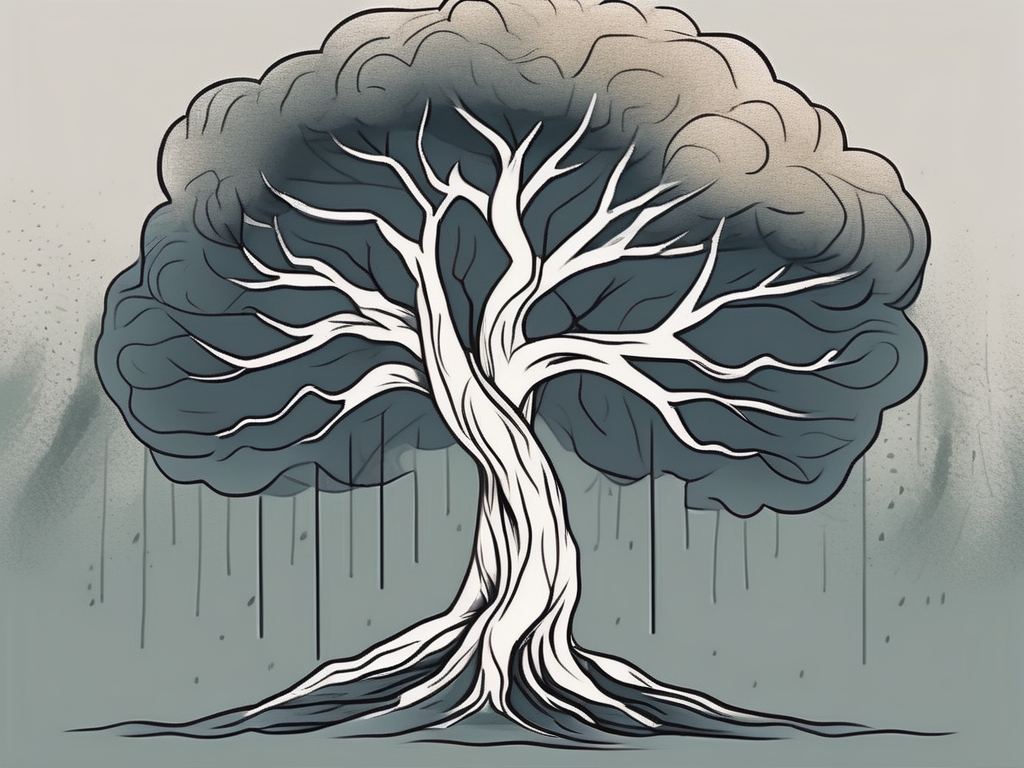In a constantly changing and unpredictable world, finding inner strength and resilience can be a challenging endeavor. This is where Stoicism, an ancient philosophy that has stood the test of time, comes into play. Stoicism offers valuable insights and practical wisdom that can guide us towards living a resilient life. In this article, we will explore the core principles of Stoicism, its historical origins, its connection to resilience, practical applications in daily life, and debunk some common misconceptions surrounding this fascinating philosophy.
Understanding Stoicism: A Brief Overview
Stoicism, a philosophy that originated in Greece during the Hellenistic period, has had a profound impact on the way individuals perceive and navigate the complexities of life. Developed by notable philosophers such as Zeno of Citium, Epictetus, and Marcus Aurelius, Stoicism offers valuable insights into the human condition and provides practical guidance on how to lead a fulfilling and virtuous life.
The core tenets of Stoicism revolve around the importance of accepting and embracing life’s uncertainties, cultivating rationality, and practicing self-discipline. By embracing these principles, individuals can develop a resilient mindset that enables them to navigate the challenges and adversities that life inevitably presents.
The Origins of Stoicism
Stoicism traces its roots back to ancient Greece, where it emerged as a response to the tumultuous times of the Hellenistic era. The ancient Stoics believed that the key to a fulfilled life lies in aligning ourselves with the natural order and accepting our fate. They looked to nature as a source of wisdom and viewed it as a guided and interconnected system where everything happens for a reason.
Through their observations of the natural world, the Stoics recognized that life is inherently unpredictable and that attempting to control external circumstances is a futile endeavor. Instead, they advocated for individuals to focus on cultivating their inner virtues and developing a sense of inner tranquility that is impervious to the fluctuations of the external world.
Key Philosophers of Stoicism
Several influential philosophers have played a pivotal role in shaping Stoicism into the profound philosophy that it is today. Zeno of Citium, often referred to as the founder of Stoicism, laid the foundation for the philosophy by developing its fundamental principles and teachings.
Epictetus, a former slave turned philosopher, further expanded on Stoic philosophy by emphasizing the importance of focusing on what we can control and accepting what we cannot. He believed that true freedom lies in our ability to detach ourselves from external outcomes and instead focus on cultivating our inner virtues and values.
Marcus Aurelius, the Roman Emperor and Stoic philosopher, is widely regarded as one of the most influential figures in Stoic philosophy. In his renowned work, “Meditations,” Aurelius explores the concept of living a virtuous life regardless of external circumstances. He emphasizes the importance of self-reflection, self-discipline, and the pursuit of wisdom as essential components of a well-lived life.
By studying the works of these notable philosophers, one can gain valuable insights into the practical applications of Stoicism and how it can be integrated into our daily lives. Stoicism offers a timeless philosophy that continues to resonate with individuals seeking to find meaning, purpose, and tranquility in an ever-changing world.
The Core Principles of Stoicism
Stoicism, an ancient philosophy developed by the Greeks, has stood the test of time and continues to offer valuable insights into living a fulfilling life. At the heart of Stoicism lie three fundamental principles that pave the way for resilience and inner strength:
The Principle of Acceptance
Stoics believe in accepting the things we cannot change and embracing life’s inevitable challenges. This principle encourages us to acknowledge the reality of our circumstances and to let go of futile attempts to control the uncontrollable. By directing our energy towards what is within our control, such as our thoughts and actions, we can free ourselves from unnecessary suffering and find peace amidst chaos.
Acceptance does not imply passivity or resignation; rather, it is a call to focus our efforts on what truly matters. By accepting the impermanence of life and the unpredictability of external events, we can cultivate a sense of equanimity and serenity.
For instance, imagine a Stoic facing a difficult situation at work. Instead of becoming overwhelmed by frustration or anger, they would accept the circumstances and focus on how they can respond with wisdom and integrity. This mindset allows them to navigate challenges with grace and resilience.
The Principle of Objectivity
In order to maintain clarity and make sound choices, Stoics emphasize the importance of viewing the world objectively. This principle encourages us to detach ourselves from our emotions and seek a broader perspective. By doing so, we can avoid being consumed by irrational thoughts and impulsive reactions.
Objectivity enables us to see situations as they truly are, rather than through the lens of our subjective biases. It allows us to step back and assess the reality of a situation, enabling us to respond with wisdom and rationality.
For example, imagine a Stoic facing a personal disagreement. Instead of letting their emotions cloud their judgment, they would strive to view the situation objectively. By considering different perspectives and examining the facts, they can make informed decisions and engage in constructive dialogue.
The Principle of Self-Discipline
Self-discipline is a crucial aspect of Stoicism. The Stoics understood that self-mastery is the key to living a virtuous life. By practicing discipline in our thoughts, actions, and desires, we become more resilient and better equipped to navigate life’s challenges.
Self-discipline involves cultivating habits that align with our values and long-term goals. It requires us to exercise control over our impulses and to act in accordance with reason and virtue. Through self-discipline, we can develop the strength of character necessary to face adversity with courage and integrity.
For instance, imagine a Stoic striving to improve their physical health. Instead of succumbing to the allure of instant gratification, they would exercise self-discipline by adhering to a regular exercise routine and maintaining a balanced diet. This commitment to self-discipline not only improves their physical well-being but also strengthens their mental resilience.
These core principles of Stoicism offer a timeless framework for navigating the complexities of life. By embracing acceptance, objectivity, and self-discipline, we can cultivate inner strength, resilience, and a sense of purpose. Stoicism reminds us that while we cannot control external events, we have the power to shape our responses and attitudes, ultimately leading to a more meaningful and fulfilling life.
Stoicism and Resilience: An Intrinsic Connection
Resilience is not the absence of adversity but the ability to bounce back and thrive in the face of challenges. Stoicism provides a valuable framework that can help us develop the resilience necessary to navigate life’s ups and downs.
Stoicism, an ancient philosophy founded in Athens by Zeno of Citium in the early 3rd century BC, offers profound insights into the human experience. It emphasizes the importance of focusing on what is within our control and accepting what is not. This philosophy has stood the test of time and continues to resonate with individuals seeking to cultivate resilience in the face of adversity.
The Stoic Approach to Adversity
Stoics argue that we have control over our response to external events, even if we cannot control the events themselves. This perspective empowers individuals to take ownership of their reactions and find meaning in challenging circumstances. By embracing challenges as opportunities for growth and reframing setbacks as valuable lessons, we can cultivate resilience and develop a more positive outlook.
Consider the example of Marcus Aurelius, the Roman Emperor and Stoic philosopher. Despite facing constant political turmoil and personal hardships, he maintained a steadfast commitment to his principles and inner tranquility. His writings, collected in his renowned work “Meditations,” serve as a testament to the power of Stoicism in navigating the complexities of life.
Building Emotional Resilience through Stoicism
In our modern society, we are often bombarded with stimuli that can trigger strong emotional reactions. Stoicism teaches us to detach ourselves from these intense emotions, acknowledging them without being consumed by them. This practice of emotional detachment allows us to approach challenges with a clear and rational mindset.
Epictetus, another influential Stoic philosopher, emphasized the importance of distinguishing between what is within our control and what is not. He believed that our emotions are largely influenced by our judgments and interpretations of events rather than the events themselves. By recognizing this, we can develop emotional resilience and maintain a more balanced state of mind.
Moreover, Stoicism encourages individuals to cultivate a sense of gratitude and appreciation for the present moment. By focusing on what we have rather than what we lack, we can shift our perspective and find solace in the midst of adversity. This practice of gratitude not only enhances our emotional resilience but also fosters a greater sense of contentment and well-being.
In conclusion, Stoicism offers a profound and timeless philosophy that can help us develop resilience in the face of adversity. By embracing challenges as opportunities for growth, reframing setbacks as valuable lessons, and cultivating emotional detachment, we can navigate life’s ups and downs with grace and fortitude. Let us embrace the wisdom of the Stoics and strive to cultivate resilience in our own lives.
Practical Applications of Stoicism in Daily Life
Stoicism is not merely an abstract philosophy – it has valuable practical applications that can be adopted in various aspects of our lives. By incorporating Stoic principles into our personal relationships and career, we can enhance our overall well-being and find greater fulfillment.
Stoicism in Personal Relationships
When it comes to personal relationships, Stoicism offers invaluable insights. By practicing empathy, understanding, and accepting the imperfections of both ourselves and others, Stoicism can improve the quality of our connections. It teaches us to focus on what truly matters and to let go of trivial distractions that might hinder our relationships with loved ones.
One of the key teachings of Stoicism is the concept of amor fati, which means “love of fate.” This principle encourages us to embrace the present moment and accept things as they are, including the flaws and shortcomings of those around us. By cultivating a mindset of acceptance, we can foster deeper compassion and understanding in our relationships.
Furthermore, Stoicism emphasizes the importance of maintaining inner tranquility and not allowing external circumstances to dictate our emotional state. This can be particularly beneficial in personal relationships, where conflicts and disagreements are inevitable. By practicing Stoic techniques such as negative visualization and reframing, we can approach conflicts with a calm and rational mindset, leading to more effective communication and resolution.
Stoicism in Career and Professional Life
In a world driven by competition and constant demands, Stoicism can provide us with the mental fortitude needed to navigate our professional lives effectively. By focusing on what is within our control, adopting a growth mindset, and maintaining equanimity, we can approach our careers with resilience and adaptability.
Stoicism teaches us to differentiate between what is within our control and what is not. Instead of wasting energy on things beyond our influence, such as the actions and opinions of others, Stoicism encourages us to focus on our own thoughts, actions, and attitudes. By directing our efforts towards what we can control – our own skills, work ethic, and personal development – we can enhance our professional performance and achieve long-term success.
Moreover, Stoicism emphasizes the importance of embracing challenges and setbacks as opportunities for growth. By adopting a growth mindset, we can view obstacles as stepping stones rather than roadblocks. This mindset shift allows us to approach setbacks with resilience and perseverance, ultimately leading to greater achievements in our careers.
Another valuable aspect of Stoicism in the professional realm is the practice of maintaining equanimity. Stoics believe that our emotional well-being should not be dependent on external circumstances, but rather on our own inner state. By cultivating a sense of inner calm and detachment from external outcomes, we can navigate the ups and downs of our careers with grace and composure.
In conclusion, Stoicism offers practical applications that can significantly enhance our personal relationships and professional lives. By incorporating Stoic principles such as empathy, acceptance, focus on what is within our control, growth mindset, and equanimity, we can cultivate a more fulfilling and resilient approach to daily life.
Misconceptions about Stoicism
While Stoicism has gained popularity in recent years, there are still some common misconceptions surrounding this ancient philosophy.
Debunking Common Myths
Contrary to popular belief, Stoicism is not about suppressing emotions or adopting a purely apathetic stance. Instead, it encourages us to acknowledge and process our emotions while maintaining rationality and not being controlled by them. Stoics also do not advocate for a life devoid of pleasure; rather, they emphasize focusing on inner virtues and finding contentment in what is truly important.
Understanding the True Essence of Stoicism
Stoicism is not a one-size-fits-all solution, nor does it guarantee a life free from challenges. It is a personal philosophy that offers guidance and tools to help us navigate life’s uncertainties with resilience and tranquility. By embracing its principles and adapting them to our own lives, we can cultivate strength and lead a more fulfilling and resilient existence.
In conclusion, Stoicism offers a valuable framework for cultivating resilience and living a resilient life. By embracing acceptance, objectivity, and self-discipline, we can navigate life’s challenges with greater equanimity. Stoicism’s intrinsic connection to resilience, practical applications in daily life, and its true essence make it a philosophy worth exploring. So why not adopt a Stoic mindset and embark on a journey towards a more resilient and meaningful life?












